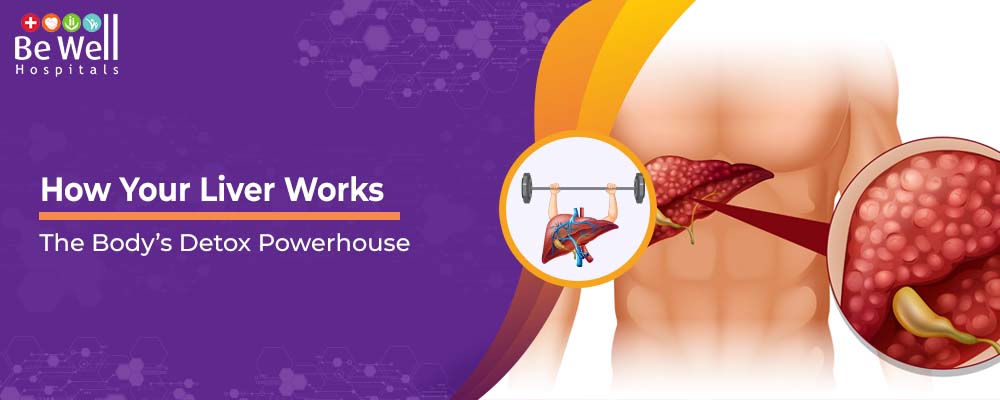How Your Liver Works: The Body’s Detox Powerhouse

Introduction
The liver is one of the most vital organs in the human body, responsible for performing hundreds of essential functions that keep us healthy. It acts as a powerhouse, regulating metabolism, detoxifying harmful substances, producing bile for digestion, and storing essential nutrients. A well-functioning liver is crucial for overall well-being, as it plays a key role in balancing blood sugar levels, supporting the immune system, and breaking down medications and toxins. However, poor lifestyle choices such as an unhealthy diet, excessive alcohol consumption, lack of exercise, and exposure to toxins can severely impact liver function, leading to serious health issues. Understanding the importance of liver health and adopting habits that support its optimal function can prevent long-term complications like fatty liver disease, hepatitis, and liver failure. In this blog, we will explore the liver’s role in the body, why maintaining liver health is essential, and how simple lifestyle changes can promote better liver function and overall wellness.
Anatomy and Location of the Liver
The liver is a large, wedge-shaped organ located in the upper right quadrant of the abdomen, just beneath the diaphragm and above the stomach, intestines, and right kidney. It is the largest internal organ, weighing about 1.5 kilograms, and plays a crucial role in maintaining overall health. Structurally, the liver is divided into two main lobes—right and left—separated by the falciform ligament. These lobes are further divided into smaller functional units called lobules, which are made up of hepatocytes, the liver’s primary cells responsible for carrying out its numerous functions. The liver has a dual blood supply, receiving oxygenated blood from the hepatic artery and nutrient-rich blood from the portal vein, which transports substances absorbed from the digestive tract. One of its key roles is bile production, which is essential for breaking down fats and aiding digestion. The bile ducts collect and transport bile to the gallbladder for storage or directly to the small intestine for use in digestion. The liver interacts closely with several organs, including the pancreas, intestines, and gallbladder, helping to regulate metabolism, detoxify the bloodstream, and process nutrients. Its strategic location and complex structure make it an indispensable organ for digestion, detoxification, and overall metabolic function.
Key Functions of the Liver
The liver is one of the most vital organs in the body, responsible for a wide range of essential functions that keep us healthy. The key functions of the human liver are
Maintaining a healthy lifestyle, avoiding excessive alcohol, and eating a balanced diet are essential steps in protecting liver health and ensuring its proper function.
How the Liver Detoxifies the Body
The liver is the body’s natural detoxification powerhouse, responsible for filtering harmful substances and ensuring that toxins do not build up in the bloodstream.
Supporting liver health through hydration, a balanced diet, and limiting alcohol and drug intake are essential to maintaining an efficient detoxification system and overall well-being.
Common Liver Diseases and Their Causes
However, various liver diseases can compromise its function, leading to serious health risks.
Early diagnosis and timely treatment are crucial for better liver health and overall well-being.
Signs of Liver Damage
Identifying these warning signs early can help prevent complications.
Maintaining a healthy lifestyle and regular check-ups can help safeguard liver health and prevent severe complications.
How to Keep Your Liver Healthy
A healthy liver is essential for overall well-being. By making smart lifestyle choices, you can protect your liver from damage and ensure it functions optimally.
By eating well, staying active, and avoiding harmful substances, you can protect your liver and improve overall health.
Conclusion
The liver is the body’s ultimate detox powerhouse, playing a crucial role in filtering toxins, metabolizing nutrients, and supporting digestion. Maintaining liver health through a balanced diet, regular exercise, and mindful lifestyle choices is essential for overall well-being. If you experience any signs of liver distress or have concerns about your liver health, seeking timely medical advice is vital.
Take proactive steps to protect your liver and ensure long-term health. Visit our Gastroenterology Department at Be Well Hospitals or call 9698 300 300 to book an appointment today.
